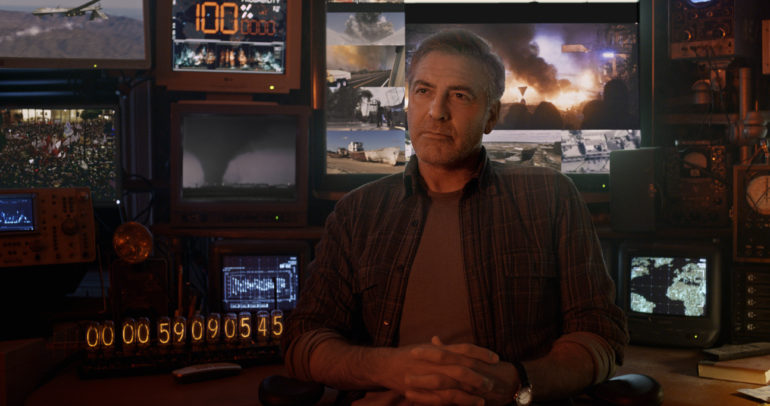For a film about a shiny new future named Tomorrowland, it lacks optimism. For some reason the movie doesn’t believe you’ll get on board with its central thesis – the triumph of hope and creativity over bleak, modern cynicism and rationality – so instead its running time is spent alternately wowing you with superficial spectacle and hammering that one salient point home. All the while, it completely forgets to deliver any kind of narrative or character development.”
Tomorrowland is at its best when it’s celebrating the reason for its existence – inventiveness. The action scenes, in particular one where George Clooney must protect his house from a squad of attackers, are full of fun and creativity. The 1950s nostalgia helps grab hold of that sense of wonder the movie is going for – harkening back to a more naïve time when, poignantly, much more seemed possible than does today.
The city of BI itself is very pretty, in a ‘Don’t Touch Anything’ sort of way. It’s full of near-future out-of-the-box technology that seems at once attainable and like nothing we’ll ever witness in our lifetime. Which is probably the point.
The problems come when the movie tries to tell its story. It could be about Casey (Britt Robertson), the young girl suddenly drawn into this anachronistic world of far-fetched technology and lofty ideals. Or it could be about Frank Walker (Clooney), the reclusive taciturn genius whose past is tied to Tomorrowland. Unfortunately, the flashback storytelling device is disjointed and doesn’t do the narrative any favours – usually wrecking the pacing and leaving the audience to wonder just what the movie is about. Tomorrowland subscribes to the Lost school of storytelling.
Aside from some vague allusions (some of which so glaring that Casey is forced to point them out in a bit of dialogue that doubles as a sort of unintentional meta-commentary), the true crux of the ‘problem’ afflicting Tomorrowland isn’t revealed until well into the final act – by which time it’s too late for the audience to get invested in the action. With the exception of Frank, we get to know so little about the characters themselves that almost nothing in the finale bears any real dramatic weight.
Co-writers Brad Bird and Damon Lindelof had some great ideas here, and the concept of Tomorrowland is fascinating enough to shore up a lot of the movie’s weaker points. But it seems like the only method Lindelof knows for character development is the revealing flashback – which doesn’t work so well in a movie about the future. If they could have just trusted the audience to grasp the relatively simple ideas they were going on so hard about, and instead focused on developing their plot and their characters, this could have been a good old-fashioned adventure movie with a message. But maybe that’s being a little too optimistic.

